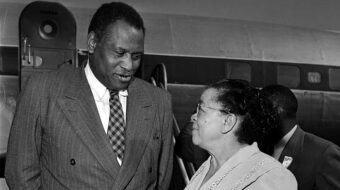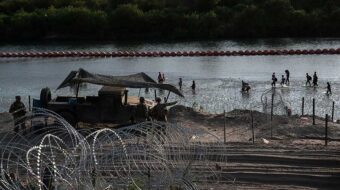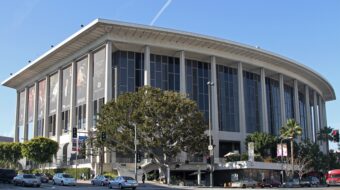SAN FRANCISCO – Gay and lesbian couples and marriage equality supporters across California celebrated U.S. District Judge Vaughan Walker’s ruling, announced Aug. 4, striking down Proposition 8, which would amend the state constitution limiting marriage to a man and a woman.
Around the Bay Area, jubilant crowds gathered at churches, community centers, city halls, and various public venues. In San Francisco, marriage equality supporters gathered in Harvey Milk Plaza – named for the civil rights leader and first openly gay elected official in California – before marching to Civic Center Plaza.
Their joy was tempered, however, by the realization that a prolonged struggle lies ahead. Many couples hoping to marry immediately found themselves waiting again, as Walker stayed his ruling temporarily while he decides whether it should be suspended pending appeal.
Rea Carey, who heads the National Gay and Lesbian Task Force, said Judge Walker’s decision “marks a victory for loving, committed couples who want nothing more than the same rights and security as other families. From the start, this has been about basic fairness.” Expressing confidence that “fairness will prevail,” she cautioned that while “the tide is turning nationwide in favor of marriage equality … a long process lies ahead.”
As expected, Prop. 8 supporters filed an appeal Aug. 5 with the Ninth U.S. Circuit Court of Appeals. It is generally expected that the case will ultimately reach the U.S. Supreme Court.
In a 136-page decision, Walker said Prop. 8 “fails to advance any rational basis in singling out gay men and lesbians for denial of a marriage license. Indeed, the evidence shows Proposition 8 does nothing more than enshrine in the California Constitution the notion that opposite-sex couples are superior to same-sex couples.”
“Because California has no interest in discriminating against gay men and lesbians, and because Proposition 8 prevents California from fulfilling its constitutional obligation to provide marriages on an equal basis, the court concludes that Proposition 8 is unconstitutional.”
While initiatives passed by voters deserve “great respect,” Walker wrote, they must “find at least some support in evidence,” especially when they involve “classifications of persons. He said the evidence showed that Prop. 8 was based only on “moral disapprobation of a group or class of citizens.”
Walker also called civil unions “a substitute and inferior institution.”
Prop. 8 was approved by voters 52 percent to 48 percent in November 2008. That ended a five-month period when gay and lesbian couples could marry, after the California Supreme Court struck down an earlier state ban on same-sex marriage in May of that year. Some 18,000 same-sex couples did marry during that period, and their marriages remain valid.
Last January two same-sex couples, Kristin Perry and Sandy Stier of Berkeley and Paul Katami and Jeff Zarrillo of Burbank, charged in a non-jury trial before Judge Walker that Prop. 8 violates the U.S. Constitution because it discriminates based on sexual orientation. Closing arguments were heard in June.
In his decision, Walker said Prop. 8’s challengers made a credible case that sexual orientation does not affect one’s ability to form a union or to parent, and that marriage equality would make society more equal without harming opposite-sex unions. But he said the chief pro-Prop. 8 witness offered no evidence, lacked scholarly credentials and his views were “entitled to essentially no weight.”
Legal commentators noted the careful “findings of fact” in the ruling, including that same-sex love and intimacy have occurred throughout human history, that individuals don’t generally choose their sexual orientation, and that Prop. 8 bolsters anti-gay and lesbian stigmas with the force of law.
Currently, same-sex couples can marry legally only in Massachusetts, Iowa, Connecticut, Vermont, New Hampshire and Washington, D.C.
Photo: Participants in a June 16 demonstration in San Francisco at the time of the closing arguments in the trial. PW/Marilyn Bechtel












Comments